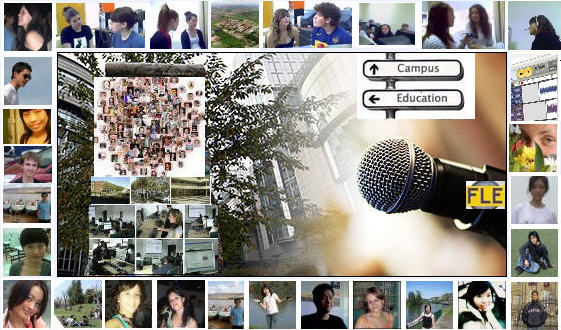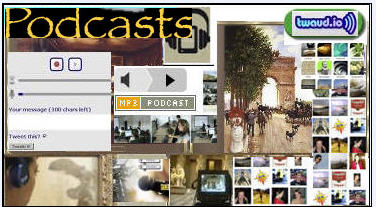BLOGS / Podcasting / Réseaux

|
COMMENT CRÉER OU ÉCOUTER UN PODCAST ? PODCASTING ET APPRENTISSAGE DES LANGUES ANNUAIRES
-
SITES - PODCASTS - ÉDUCATION
|
BLOGS / Podcasting / Réseaux
COMMENT CRÉER OU ÉCOUTER UN PODCAST ?PODCASTING ET APPRENTISSAGE DES LANGUES
ANNUAIRES - SITES - PODCASTS - ÉDUCATION

Podcasting Weblogs Education - Apprentissage Enseignement Langues
La notion de podcasting (baladodiffusion) évoque un moyen de diffusion de fichiers audio sur le web, auxquels peuvent s´abonner les internautes, via un flux de syndication (RSS). Les termes audioblog, radioblog ou podcast représentent différentes variantes intégrant des fichiers son, du streaming ou un fil RSS dans un weblog. Parallèlement les vidéoblogs, podcast vidéo ou vlogs intègrent des fichiers vidéo, du streaming ou un fil RSS dans un weblog et fréquemment ils se présentent comme des communautés de partage/émission des vidéos (Blip TV, Dailymotion, UStream, Youtube).
Podcasting: the process of capturing an audio event, song, speech, or mix of sounds and then posting that digital sound object to a web site or blog in a data structure called an RSS 2.0 envelope or feed (Meng, 2005).
Le mot podcasting est un mot-valise provenant de la fusion des mots « iPod » et « broadcasting » « iPod » est le baladeur d’Apple Computer, nom de marque tellement populaire qu’il est devenu nom commun ; le mot « broadcasting », signifie diffusion. Les traductions baladodiffusion et baladiffusion ont été proposées fin octobre 2004 par l’Office québécois de la langue française. Ces deux mots-valises sont formés de "baladeur" et de "radiodiffusion" (Phalippon & Chauvin, 2006).
Les potentiels du podcasting / baladodiffusion pour l'enseignement des langues restent encore à développer:
- Les podcasts constituent de remarquables materiels authentiques pour l'apprentissage (linguistique, socioculturel, interculturel).
- Les podcasts peuvent faire partie de différentes approches et contextes didactiques (behaviorisme, constructivisme, communicative).
- Un outil et un media dynamique, attractif, motivant et facile à intégrer en éducation (Meng 2005, Rosell-Aguilar 2007).
- Mais l'efficacité du podcasting est en fonction des objectifs et des compétences pédagogiques bien définis.
- Le podcasting doit encore développer en éducation ses dimensions interactives, communicatives, collaboratives.
- Pour l'enseignement des langues ce media doit encore dérouler les compétences de production langagière et spécialement la production orale.

APPLICATIONS PODCASTING - CAMPUS VIRTUEL FLE
Les recherches du Campus Virtuel FLE - Projet Flenet ont utilisé les nouveaux médias
et le podcasting dans différents constextes / dispositifs de formation et projets de télécollaboration
pour l'enseignement / apprentissage du français langue étrangère,
spécialement pour le développement des compétences orales (CO - PO) chez les étudiants.
MODALITÉS D'UTILISATION:
1. Matériels authentiques: fichiers audio et vidéo dans différentes tâches pédagogiques:
2. Compréhension orale des apprenants de FLE
Podcasts Audio:
Campus Soundclaud - RadioFLE AudioBoo - Podomatic FLE - Campus
Podcasts Video:
FLE Dailymotion - Campus Blip TV
3. Production orale des apprenants de FLE
3.1. AudioBlogs et Podcasts des étudiants
3.2. AudioBlogs et Podcasts de la classe
4. Echanges et collaboration entre étudiants
4.1. Projets de la classe
4.2. Projets de télécollaboration
PROJET LEÓN - GRENOBLE Universités de Grenoble et León
PROJET - ECHANGES LEÓN - LILLE Universités de Lille et León
EUROSPHÈRE - ÉCHANGES LYCÉENS
5. Evaluation, tutorat, correction prononciation
5.1. Correction par l'enseignant ou tuteurs
5.2. Corrections collaboratives
5.3. Autocorrections
Recherches Prononciation Etudiants

RAPPORTS - DOSSIERS - RÉFÉRENCESBaladodiffusion / Podcasting Education Langues
http://flecampus.ning.com/profiles/blogs/podcasts-et-baladodiffusionSocial Media Education Podcasting Apprentissage Langues
http://flecampus.ning.com/profiles/blogs/podcasting-baladodiffusionDossier Baladodiffusion - Eduscol
http://eduscol.education.fr/numerique/dossier/archives/baladodiffusionDossier Podcast - Franc-Parler
http://francparler-oif.org/FP/fiches/podcasts1.htmMalavaux, O., Mazaudier, M. (2008) Les apports de la baladodiffusion dans les apprentissages et l'évaluation
des compétences langagières des élèves. Rapport de l' Académie de Besançon. En ligne:
http://www.ac-nice.fr/dane/documents/Innover_avec_le_numerique/Balladodiffusion/Utilisation_baladodiffusion.pdfPatenotte, A.M. - Baladodiffusion en lettres (CRDP de Buc)
http://blog.crdp-versailles.fr/baladodiffusionlettres/index.php/Podcasting, Langues et Médias Sociaux (Réseaux Education FLE Langues)
http://0z.fr/rkaAbPodcasting and Vodcasting In Higher Education: How Disruptive Will They Be?
http://www.masternewmedia.org/news/2005/04/16/podcasting_and_vodcasting_in_higher.htmPodcasts en classe de lettres - Académie de Grenoble
http://www.ac-grenoble.fr/disciplines/lettres/podcast/Podcast/Accueil.htmlPodcasts in Education (S.McMinn, R.Smith)
http://sites.wiki.ubc.ca/etec510/Podcasts_in_EducationHistorique Premiers Podcasts Apprentissage Langues
http://flecampus.ning.com/profiles/blogs/podcasts-langues-historiqueRéseaux Médias Sociaux et Apprentissage des langues - Language learning and social networks
http://flecampus.ning.com/profiles/blogs/apprentissage-des-langues-et
Abdous, M. (2009) MALL Technology: Use of Academic Podcasting in the Foreign Language Classroom, ReCALL, v.21 n.1 pp.76-95.
Campbell, G. (2005) There’s Something in the Air: Podcasting in Education. EDUCAUSE Review, 40(6), 33-46. En ligne: http://www.educause.edu/ir/library/pdf/erm0561.pdf
Chan, W. M., Chen, I. R., & Döpel, M. (2008) Learning on the move: Applying podcasting technologies to foreign language learning. Paper presented at WorldCALL 2008, Fukuoka, Japan.
Chinnery, G. M. (2006) Going to the MALL: Mobile assisted language learning. Language Learning & Technology, 10(1), 9-16. En ligne: http://llt.msu.edu/vol10num1/emerging/default.html
Diem (2005) Podcasting: A new way to reach students. The Language Teacher, 29 (8), pp. 45-46.
Ducate, L., & Lomicka, L. (2009) Podcasting in the language classroom: Inherently mobile or not? In R. Oxford & J. Oxford, (Eds.), Second language teaching and learning in the Net Generation (pp. 113–128). Honolulu: University of Hawai‘i, National Foreign Language Resource Center.
Ducate, L., & Lomicka, L. (2009) Podcasting: An Effective Tool for Honing Language Students’ Pronunciation? Language Learning & Technology, 13(3): 66-86. En ligne: http://llt.msu.edu/vol13num3/ducatelomicka.pdf
Edirisingha, P., Salmon, G. (2007) Pedagogical models for podcasts in higher education. University of Leicester, UK
http://podcastingforpp.pbwiki.com/f/palithra.pdfEdirisingha, P., Chiara, R. Nie, M. and Rothwell, L. (2007) Podcasting to Provide Teaching and Learning Support for an Undergraduate Module on English Language and Communication. Turkish Online Journal of Distance Education. 8 (3), 87-107. En ligne: http://tojde.anadolu.edu.tr/tojde27/pdf/article_6.pdf
Facer, B.R. & Abdous, M. (Eds.) (2011) Academic Podcasting and Mobile Assisted Language Learning: Applications and Outcomes
Hershey, Pennsylvania: IGI Global.Fareed, W. (2010) Affordances Analysis of an Audioblog and Suggestions for its Recruitment and Use in Oral Lessons. International Journal of Instructional Technology and Distance Learning. En ligne: http://itdl.org/Journal/Aug_10/article04.htm
Godwin-Jones, R. (2005) Skype and Podcasting: Disruptive Technologies for Language Learning. Language Learning & Technology, 9/3, septembre 2005, pp. 9-12. http://llt.msu.edu/vol9num3/pdf/emerging.pdf
Harris, H. and S. Park (2007). Educational usages of podcasting. British Journal of Educational Technology 39(3): 548-551.
Hsu, H.-Y., Wang, S.-K., & Comac, L. (2008) Using audioblogs to assist English language learning: An investigation into student perception. Computer Assisted Language Learning, 21, 181–198.
Hung, S.T. (2010) Pedagogical applications of Vlogs: An investigation into ESP learners' perceptions. British Journal of Educational Technology.
En ligne: http://onlinelibrary.wiley.com/doi/10.1111/j.1467-8535.2010.01086.x/fullLee, M.J.W. & Chan, A. (2007) Reducing the effects of isolation and promoting inclusivityfor distance learners through podcasting, Turkish Online Journal of Distance Education, 8, 1,85-104. En ligne: http://tojde.anadolu.edu.tr/tojde25/pdf/article_7.pdf
Lévy, M. (2009) Technologies in use for Second Language Learning. The Modern Language Journal; Volume 93, Issue Supplement s1, pages 769–782. En ligne: http://onlinelibrary.wiley.com/doi/10.1111/j.1540-4781.2009.00972.x/full
Lomicka, L. & Lord, G. (2011) Podcasting – Past, Present and Future: Applications of Academic Podcasting In and Out of the Language Classroom (pp. 1-20). In B.R. Facer and M. Abdous, (Eds.), Academic Podcasting and Mobile Assisted Language Learning: Applications and Outcomes., IGI Global, Hershey, PA.
Lord, G. (2008) Podcasting communities and second language pronunciation. Foreign Language Annals, 41(2), 364-379. En ligne:
http://onlinelibrary.wiley.com/doi/10.1111/j.1944-9720.2008.tb03297.x/pdfO’Bryan, A. & Hegelheimer, V. (2007) Integrating CALL into the classroom: the role of podcasting in an ESL listening strategies course. ReCALL, 19/2, mai 2007, pp. 162-180
McCarty, S. (2005) Cultural, disciplinary and temporal contexts of e-Learning and English as a Foreign Language. eLearn Magazine: Research Papers, April 2005. En ligne: http://www.elearnmag.org/subpage.cfm?section=research&article=4-1
McCarty, S. (2005) Spoken Internet To Go: Popularization through Podcasting. JALT CALL, 1(2), 67-74. En ligne: http://www.waoe.org/president/podcasting_article.html
McLoughlin, C., Lee, M.J.W. & Chan, A. (2007) Promoting engagement and motivation for distance learners through Podcasting. En ligne:
http://csusap.csu.edu.au/~achan/papers/2007_POD_EDEN.pdfMcQuillan, J. (2006) IPod in education: The potential for language acquisition. White Paper. En ligne:
http://images.apple.com/ca/education/docs/leaders/Apple-iPodLangAcquisition.pdfMeng, P. (2005) Podcasting & Vodcasting: a white paper, Definitions, discussions & implications. University of Missouri IAT services.
Nie, M., Cashmore, A., Cane, C. (2008) The educational value of student- generated podcasts, in Whitton, N., and McPherson, M. (Eds), Rethinking the digital divide Research Proceedings of the 15th Association for Learning Technology Conference (ALT-C 2008). Held 9–11 September 2008, University of Leeds, England, UK.
Petersen, S.A., Divitini, M.(2005) Language learning: from individual learners to communities; Wireless and Mobile Technologies in Education. En ligne: http://ieeexplore.ieee.org/stamp/stamp.jsp?tp=&arnumber=1579258
Rosell-Aguilar, F. (2007) Top of the Pods - In Search of a Podcasting "Podagogy" for Language Learning; Computer Assisted Language Learning Vol. 20, No. 5, pp. 471-492. En ligne: http://students.kennesaw.edu/~ppeoples/Podcasting%20For%20Language%20Learning.pdf
Rosell-Aguilar, F. (2009) Podcasting for language learning: Re-examining the potential. In L. Lomicka & G. Lord (Eds.), The Next Generation: Social Networking and Online Collaboration in Foreign Language Learning (pp. 13-34). San Marcos, TX: CALICO.
Salmon, G. & Edirisingha, P. (Eds.) (2008) Podcasting for Learning in Universities Open University Press/McGraw Hill.
Sertling Miller, J. & Cummings Hlas, A.(2010) The Possibilities and Potential of Podcasting, in 2020, in Bloom & Gascoigne (ed.), Vision for 2010: Developing Global Competence, Report of the Central States Conference on the Teaching of Foreign Languages, pp.27-44
http://www.csctfl.org/documents/CSCTFL_Report_2010.pdfStanley, G. (2006). Podcasting: Audio on the Internet Comes of Age. TESL-EJ, 9(4).
Stoerger, S. (2005) Podcasting in Higher Education - Annotated Bibliography. En ligne: http://ella.slis.indiana.edu/~sstoerge/podhe.htm
Sun, Y. C. (2009) Voice blog: An exploratory study of language learning. Language Learning & Technology, 2(88-103).
Tohill, K. (2008) I Podcast, You Podcast, Together We Podcast: Podcasting as a Learning Tool in Second Language Classrooms. In K. McFerrin et al. (Eds.), Proceedings of Society for Information Technology & Teacher Education International Conference 2008 (pp. 3645-3650).Chesapeake,VA:AACE.
Tomé, M. (2009) Compétences orales et outils de communication Web dans un projet de télécollaboration pour l’apprentissage du FLE, The Journal of Distance Education / Revue de l'Éducation à Distance, Vol. 23, No. 1, 107-126. En ligne: http://www.jofde.ca/index.php/jde/article/view/578/837
Tomé, M. (2009) Productions orales, weblogs et télécollaboration avec le web 2.0 pour le FLE, Revue ALSIC (Apprentissage des Langues et Systèmes d' Information et de Communication), Vol.12 - En ligne: http://alsic.revues.org/1279
Tomé, M. (2011) Réseaux et médias sociaux sur internet pour l’apprentissage de la prononciation d’une langue étrangère, The Journal of Distance Education / Revue de l'Éducation à Distance, Vol. 25, No. 2. http://www.jofde.ca/index.php/jde/article/view/724/1261
Tomé, M. & Richters, M.A. (2020) Podcasting as a tool to develop speaking skills in the foreign language classroom, The EUROCALL Review, vol. 28, nº 1: 40-56. https://polipapers.upv.es/index.php/eurocall/article/view/13191 - PDF - Eurocall web
Young, D. J. (2007) IPods, MP3 players and podcasts for FL learning: Current practices and future considerations. NECTFL Review, 60, 39-49. En ligne:
http://www2.dickinson.edu/prorg/nectfl/review60.pdf
Copyright ©
Français langue étrangère et Internet (FLENET)
Universidad de León (España)